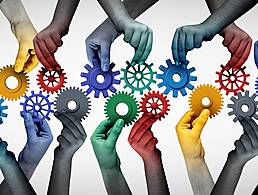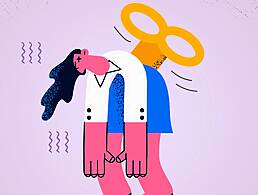Is unconscious bias training the key to achieving workplace diversity and inclusion? The evidence suggests no.
We all have unconscious or implicit biases and, according to the Kirwan Institute at Ohio State University, we typically hold implicit biases in favour of “our own ingroup”. Implicit biases, it says, are pervasive, mental constructs that are “not accessible through introspection”. Despite the values you consciously align with, your implicit biases are often “incompatible” with them.
While working on this article, I took an implicit-association test on Harvard’s website. It was free to do and had a number of options, from weapons bias to sexuality bias. I answered various anonymous questions about my age, sexual orientation and level of education and then took part in a seven-part test where I had to categorise items as quickly as possible.
The categories were male, female, career and family and, based on my reactions, I came out with a “slight automatic association for male with career and female with family”. I went into this test absolutely positive that my values would dictate my outcome and, needless to say, I was dismayed with my result. However, based on one Vox reporter’s inconsistent experiences with the test, I wanted to repeat his experiment.
Like him, I got different results each time. When Vox spoke to Project Implicit about this, its director of research said that the implicit-association test can’t predict behaviour at individual levels. Users would have to take a large number of tests to form any sort of realistic conclusion. And yet, there’s a strong chance people have been going into the test for years and taking its initial findings as a true indication of their level of bias.
Are we wasting time on unlearning?
Methods such as the implicit-association test assume that our unconscious biases are malleable. They can apparently be unlearned, albeit gradually, through a number of techniques.
But have we become overly reliant on some tactics? Unconscious or implicit bias training, for example, has been employed by many companies in a bid to foster greater diversity and inclusion. The programme usually involves a series of online exercises that help workers identify their own unconscious biases, such as racism, and subsequently work to eliminate them.
In this piece, Chanda Prescod-Weinstein explains why she is against “diversity as an industry and as an ideological ideal”. Equity, she argues, is the “central tenet” we should be working from, which highlights one potential problem that exists within unconscious bias training where diversity is often the central tenet.
Prescod-Weinstein goes on to say that unconscious bias training, which often encourages companies to “admit and hire minorities”, reinforces the message that businesses must sacrifice some quality to achieve diversity.
Here in Ireland, NUI Galway psychologist Dr Chris Noone, has also made his views on implicit bias training known. I spoke to him about it, hoping to hear his thoughts on why so many view unconscious bias training as the perfect solution to achieving diversity.
“Implicit bias training is cheap and easy to implement. In addition, the assumption rationale for this approach to reducing sexism, racism, homophobia, biphobia and transphobia is fairly intuitive and appears – superficially I would say – to be supported by evidence,” he said
“Finally, the underlying premise of these trainings is that many of the inequalities in society and organisations are the result of negative stereotypes that we learn unintentionally. This is important because it removes agency and responsibility for the prejudicial and unequal treatment of marginalised groups from both the organisation and the individuals within the organisation.”
This reflects Prescod-Weinstein’s words, which suggest that unconscious bias training methods are likely to have been developed under a privileged person’s narrative. In the case of training to eliminate racist prejudices, for instance, the modules may have been set by white people, ultimately removing the critical experiences of black people from the equation.
There is ‘limited evidence’ for unconscious bias training
In addition to all of this, the bottom line is that unconscious bias training simply doesn’t work very well. Noone explained that there is “limited evidence that they work”.
“The basic science that spurred the development of implicit bias training has come in for strong criticism and systematic reviews of the effectiveness of implicit bias training tend to conclude that we cannot rely on it to change behaviour,” he said.
“Looking at the issue in more depth, implicit bias training falls short because of its totally underwhelming aim. Why are we just trying to reduce the extent to which people are, for example, unconsciously racist? Wouldn’t it be much better to teach people how to be consciously anti-racist?
“That should be the future of diversity and inclusion: people learning that they should challenge sexism, racism, homophobia, biphobia and transphobia, and giving them the skills to do so.”
Check out this fantastic resource guide which will help you improve how you support your trans, non-binary and gender non-conforming students ?️?
Thanks to Dr Chris Chevallier and Dr Conor Buggy for developing it!https://t.co/MIdFU0v20m pic.twitter.com/l4xpGoXR9Y
— Chris Noone (He/Him) (@Chris_Noone_) July 1, 2020
I asked Noone if he had any thoughts on how companies could do better. He said targeting the “systemic roots” of inequality through structural change is key.
“For example, ensuring that women have pay parity and equal access to promotion, that gay and bi people can be out and visible at work, that trans people have access to leave and support when transitioning.
“Staff training needs to focus on making it easier to challenge prejudice and make visible a culture of inclusion and diversity. For example, we developed an LGBT+ Ally programme at NUI Galway to give people the skills to support their LGBT+ colleagues and to show their support tangibly using stickers, posters and email signatures. This is more than a tick-the-box exercise.”




